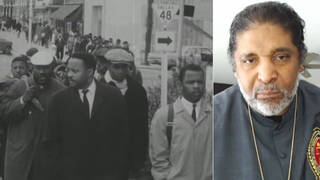
Guests
- David Cay JohnstonPulitzer Prize-winning investigative journalist. His most recent book is titled Free Lunch: How the Wealthiest Americans Enrich Themselves at Government Expense (and Stick You with the Bill).
There’s a battle looming in Washington over the future of tax cuts for the wealthy. The cuts enacted by President Bush are set to expire at the end of the year. Republicans, led by House Minority Leader John Boehner, have called for extending the $700 billion in tax breaks for the rich. But President Obama strongly criticized the GOP and emphasized his opposition to extending the tax cuts. We speak with Pulitzer Prize-winning investigative journalist, David Cay Johnston. [includes rush transcript]
Transcript
JUAN GONZALEZ: There’s a battle looming in Washington over the future of tax cuts for the wealthy. The cuts enacted by President Bush are set to expire at the end of this year. Republicans, led by House Minority Leader John Boehner, have called for extending the $700 billion in tax breaks for the rich. But in his second economic speech this week, President Obama lashed out against Republican economic policies and emphasized his opposition to extending the cuts for, quote, “folks who are already millionaires.”
Speaking in Cleveland, Ohio Wednesday, the President instead called for keeping the tax breaks only for families that make under $250,000 a year.
PRESIDENT BARACK OBAMA: With all the other budgetary pressures we have, with all the Republicans’ talk about wanting to shrink the deficit, they would have us borrow $700 billion over the next ten years to give a tax cut of about $100,000 each to folks who are already millionaires. So, let me be clear to Mr. Boehner and everybody else. We should not hold middle-class tax cuts hostage any longer. We are ready this week, if they want, to give tax cuts to every American making $250,000 or less. That’s 98, 97 percent of Americans. Now, for any income over this amount, the tax rates would just go back to what they were under President Clinton. This isn’t to punish folks who are better off — God bless them — it’s because we can’t afford the $700 billion price tag.
AMY GOODMAN: President Obama speaking in Cleveland, Ohio Wednesday.
Well, for more on the future of Bush’s tax cuts, as well as President Obama’s announcement of new business tax breaks that he says will help boost the economy, we’re joined from Rochester, New York, by the Pulitzer Prize-winning investigative journalist David Cay Johnston. His most recent book is called Free Lunch: How the Wealthiest Americans Enrich Themselves at Government Expense (and Stick You with the Bill). He’s a former reporter at the New York Times.
David, welcome to Democracy Now! Lay out what this issue is. What are the tax cuts? Who do they benefit? And what about the fact that the top budget adviser to President Obama, his former adviser, Orszag, is saying stick with the Bush tax cuts?
DAVID CAY JOHNSTON: Well, when President Bush came into office, he had a tax cut proposal. It was the key thing in his campaign. He did not, however, pass it through normal legislative means. They did it through something called reconciliation. You’ll recall that’s how healthcare was passed earlier this year. And that meant there was a ten-year limit on these tax cuts. The Republicans at one point during the last decade controlled the House, the Senate and the White House, but they did not make these tax cuts permanent. And the issue now is that the Republicans’ position, at least so far, has been that they will not support anything the President is proposing, which means everyone’s taxes would go back up January 1st. That is, the Republicans’ position, if it stands, is higher taxes for everyone. The President’s position is higher taxes only for only those people in the top two or three percent.
Not being discussed in all of this are two crucial issues. One of them is how much those tax cuts cost us. Basically, all the income taxes that everyone in America paid in January and February of this year only went to cover interest on the money borrowed for the Bush tax cuts over the last decade. Just interest on those tax cuts.
The second issue not being discussed is that this top tax rate, the two that President Obama wants to have go back to the Clinton-era level, they cut in at a quarter-million dollars and about $400,000 of taxable income. In fact, we have a large number of people in this country now who are making multimillion-dollar annual incomes, and we’re not talking about a higher tax rate on them. We’re starting actually at a very low level. And the very highest-paid workers in the history of the world, hedge fund managers, at least twenty-five of whom made a billion dollars last year, pay a current tax rate of zero. The news media keeps saying 15 percent. They pay the 15 percent, when they cash out, which could be decades from now. None of that is on the table.
JUAN GONZALEZ: Now, what about —-
DAVID CAY JOHNSTON: Oh, and you asked about Peter Orszag.
AMY GOODMAN: Yes, Peter Orszag.
DAVID CAY JOHNSTON: Mr. Orszag’s -— Peter Orszag, who just left as head of the Congressional Budget Office, in his new column in the New York Times, has said we should continue the Bush tax cuts for two years because they have a stimulative effect on the economy, and then we should change. If I were Mr. Orszag — and he’s a very serious fellow on these issues — I certainly would want to do something to draw attention to my column in the beginning. I don’t see anybody but Peter Orszag making that argument right now, but perhaps the Republicans will adopt his idea of a two-year extension.
JUAN GONZALEZ: Now, what about the President’s proposal this week to extend basically tax breaks to small business as a means of attempting to further stimulate the economy?
DAVID CAY JOHNSTON: Well, what the President has proposed doing, essentially, is something called expensing. If you own a small business and you go buy, say, a new computer system, you have to write it off over a period of years if it costs more than a quarter of a million dollars. In the case of computers, it’s three or five years. The President is proposing that if you make an investment in 2011, you can write it off immediately. Now, the effect of that is simply timing. It’s not a tax cut. It just means you get your tax break in full today rather than over a period of years. That will tend to encourage businesses to buy equipment that year. But it also means, as we saw with the “Cars for Clunkers” program and the homebuyer credit, that it brings some demand forward, and then demand falls off later on. The business community is not eager for this, because to pay for it, the President says we should tighten up on a bunch of other business loopholes. And that’s been one of his fundamental principles. If you’re going to cut a tax somewhere, you need to pay for it somewhere else. And the business community doesn’t see expensing as being valuable to them, especially if it means, in other areas, some of the loopholes will be tightened up.
JUAN GONZALEZ: Well, President Obama mentioned House Republican Leader John Boehner by name eight times in his speech. And appearing on Good Morning America Wednesday, Boehner said the tax cuts should be extended for another two years.
REP. JOHN BOEHNER: Why wouldn’t we work together to make it clear that all current tax rates will be extended for the next two years?
GEORGE STEPHANOPOULOS: So you’re open to —-
REP. JOHN BOEHNER: What that will do -— what that will do is help small businesses, who have no clue what the coming tax rates are going to be, gives them some certainty. And if we’re able to do this together, I think we’ll show the American people that we understand what’s going on in the country, and we’ll be able to get our economy moving again and get jobs growing in America.
JUAN GONZALEZ: David Cay Johnston, your response, and how seriously you think the Obama administration is considering this two-year extension?
DAVID CAY JOHNSTON: I haven’t seen any indication the President is in favor of this idea of a two-year extension, but he may change if he decides that’s in his interest. Clearly, he mentioned Boehner eight times because he’s trying to get someone who personifies the position of the Republicans on these issues. But keep in mind something very important: most small businesses — and I’m actually co-owner and chairman of a small business — do not pay federal corporate income taxes. Businesses are designed to draw down, and take out as compensation retirement benefits or acquiring assets, their profits. So, this really isn’t about small business in the sense of the people you encounter who are petty merchants, small manufacturers, have a little place with twenty-five or fifty people.
AMY GOODMAN: David Cay Johnston, last question: what do you feel would single-handedly most stimulate the economy and make the biggest difference right now?
DAVID CAY JOHNSTON: Well, a recession is, by definition, the collapse of demand. People don’t have money to spend. If you own a small business, you don’t care nearly as much about a tax cut as having more customers who can spend more money buying your products and your services. One way to think about this is that thirty years of supply-side economics have left us with this enormous supply of capital. American companies have $1.8 trillion of cash right now. Now, understand what that means. It’s $6,000 for each man, woman and child in America, cash they’re not investing, they’re not using to create jobs, to increase their profits; they’re just hanging onto it.
So, on the other side of this, people don’t have jobs. We have 15 million people nearly out of work, many of them more than six months, and another 12 million or so who can’t find as much work as they want or who have quit looking for work. We have an imbalance. And in the same way that in your body your arterial and venous blood flows have to equalize or you don’t live, we have these huge pools of capital that cannot be profitably put to work right now. So what the government should be doing is focusing on demand. And if Obama turns out to be a one-term president, the principal reason, I suspect, will be that he did not put in a large enough stimulus package in the beginning to overcome the collapse of demand brought about by years of policies that focused on pushing down wages and increasing profits to businesses.
AMY GOODMAN: David Cay Johnston, we want to thank you for being with us. His latest book, Free Lunch: How the Wealthiest Americans Enrich Themselves at Government Expense (and Stick You with the Bill). Former reporter at the New York Times, Pulitzer Prize-winning journalist.












Media Options